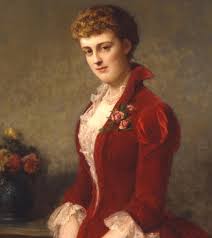Ethan Frome Page #27
Ethan Frome is a 1911 book by American author Edith Wharton. It is set in the fictitious town of Starkfield, Massachusetts. The novel was adapted into a film, Ethan Frome, in 1993.
Great was her amazement, and that of old Mrs. Varnum, on learning that Ethan Frome's old horse had carried me to and from Corbury Junction through the worst blizzard of the winter; greater still their surprise when they heard that his master had taken me in for the night. Beneath their wondering exclamations I felt a secret curiosity to know what impressions I had received from my night in the Frome household, and divined that the best way of breaking down their reserve was to let them try to penetrate mine. I therefore confined myself to saying, in a matter-of-fact tone, that I had been received with great kindness, and that Frome had made a bed for me in a room on the ground-floor which seemed in happier days to have been fitted up as a kind of writing-room or study. “Well,” Mrs. Hale mused, “in such a storm I suppose he felt he couldn't do less than take you in--but I guess it went hard with Ethan. I don't believe but what you're the only stranger has set foot in that house for over twenty years. He's that proud he don't even like his oldest friends to go there; and I don't know as any do, any more, except myself and the doctor...” “You still go there, Mrs. Hale?” I ventured. “I used to go a good deal after the accident, when I was first married; but after awhile I got to think it made 'em feel worse to see us. And then one thing and another came, and my own troubles... But I generally make out to drive over there round about New Year's, and once in the summer. Only I always try to pick a day when Ethan's off somewheres. It's bad enough to see the two women sitting there--but his face, when he looks round that bare place, just kills me... You see, I can look back and call it up in his mother's day, before their troubles.” Old Mrs. Varnum, by this time, had gone up to bed, and her daughter and I were sitting alone, after supper, in the austere seclusion of the horse-hair parlour. Mrs. Hale glanced at me tentatively, as though trying to see how much footing my conjectures gave her; and I guessed that if she had kept silence till now it was because she had been waiting, through all the years, for some one who should see what she alone had seen. I waited to let her trust in me gather strength before I said: “Yes, it's pretty bad, seeing all three of them there together.” She drew her mild brows into a frown of pain. “It was just awful from the beginning. I was here in the house when they were carried up--they laid Mattie Silver in the room you're in. She and I were great friends, and she was to have been my bridesmaid in the spring... When she came to I went up to her and stayed all night. They gave her things to quiet her, and she didn't know much till to'rd morning, and then all of a sudden she woke up just like herself, and looked straight at me out of her big eyes, and said... Oh, I don't know why I'm telling you all this,” Mrs. Hale broke off, crying. She took off her spectacles, wiped the moisture from them, and put them on again with an unsteady hand. “It got about the next day,” she went on, “that Zeena Frome had sent Mattie off in a hurry because she had a hired girl coming, and the folks here could never rightly tell what she and Ethan were doing that night coasting, when they'd ought to have been on their way to the Flats to ketch the train... I never knew myself what Zeena thought--I don't to this day. Nobody knows Zeena's thoughts. Anyhow, when she heard o' the accident she came right in and stayed with Ethan over to the minister's, where they'd carried him. And as soon as the doctors said that Mattie could be moved, Zeena sent for her and took her back to the farm.” “And there she's been ever since?” Mrs. Hale answered simply: “There was nowhere else for her to go;” and my heart tightened at the thought of the hard compulsions of the poor. “Yes, there she's been,” Mrs. Hale continued, “and Zeena's done for her, and done for Ethan, as good as she could. It was a miracle, considering how sick she was--but she seemed to be raised right up just when the call came to her. Not as she's ever given up doctoring, and she's had sick spells right along; but she's had the strength given her to care for those two for over twenty years, and before the accident came she thought she couldn't even care for herself.” Mrs. Hale paused a moment, and I remained silent, plunged in the vision of what her words evoked. “It's horrible for them all,” I murmured. “Yes: it's pretty bad. And they ain't any of 'em easy people either. Mattie was, before the accident; I never knew a sweeter nature. But she's suffered too much--that's what I always say when folks tell me how she's soured. And Zeena, she was always cranky. Not but what she bears with Mattie wonderful--I've seen that myself. But sometimes the two of them get going at each other, and then Ethan's face'd break your heart... When I see that, I think it's him that suffers most... anyhow it ain't Zeena, because she ain't got the time... It's a pity, though,” Mrs. Hale ended, sighing, “that they're all shut up there'n that one kitchen. In the summertime, on pleasant days, they move Mattie into the parlour, or out in the door-yard, and that makes it easier... but winters there's the fires to be thought of; and there ain't a dime to spare up at the Fromes.'” Mrs. Hale drew a deep breath, as though her memory were eased of its long burden, and she had no more to say; but suddenly an impulse of complete avowal seized her. She took off her spectacles again, leaned toward me across the bead-work table-cover, and went on with lowered voice: “There was one day, about a week after the accident, when they all thought Mattie couldn't live. Well, I say it's a pity she did. I said it right out to our minister once, and he was shocked at me. Only he wasn't with me that morning when she first came to... And I say, if she'd ha' died, Ethan might ha' lived; and the way they are now, I don't see's there's much difference between the Fromes up at the farm and the Fromes down in the graveyard; 'cept that down there they're all quiet, and the women have got to hold their tongues.”
Translation
Translate and read this book in other languages:
Select another language:
- - Select -
- 简体中文 (Chinese - Simplified)
- 繁體中文 (Chinese - Traditional)
- Español (Spanish)
- Esperanto (Esperanto)
- 日本語 (Japanese)
- Português (Portuguese)
- Deutsch (German)
- العربية (Arabic)
- Français (French)
- Русский (Russian)
- ಕನ್ನಡ (Kannada)
- 한국어 (Korean)
- עברית (Hebrew)
- Gaeilge (Irish)
- Українська (Ukrainian)
- اردو (Urdu)
- Magyar (Hungarian)
- मानक हिन्दी (Hindi)
- Indonesia (Indonesian)
- Italiano (Italian)
- தமிழ் (Tamil)
- Türkçe (Turkish)
- తెలుగు (Telugu)
- ภาษาไทย (Thai)
- Tiếng Việt (Vietnamese)
- Čeština (Czech)
- Polski (Polish)
- Bahasa Indonesia (Indonesian)
- Românește (Romanian)
- Nederlands (Dutch)
- Ελληνικά (Greek)
- Latinum (Latin)
- Svenska (Swedish)
- Dansk (Danish)
- Suomi (Finnish)
- فارسی (Persian)
- ייִדיש (Yiddish)
- հայերեն (Armenian)
- Norsk (Norwegian)
- English (English)
Citation
Use the citation below to add this book to your bibliography:
Style:MLAChicagoAPA
"Ethan Frome Books." Literature.com. STANDS4 LLC, 2025. Web. 26 Feb. 2025. <https://www.literature.com/book/ethan_frome_264>.








Discuss this Ethan Frome book with the community:
Report Comment
We're doing our best to make sure our content is useful, accurate and safe.
If by any chance you spot an inappropriate comment while navigating through our website please use this form to let us know, and we'll take care of it shortly.
Attachment
You need to be logged in to favorite.
Log In